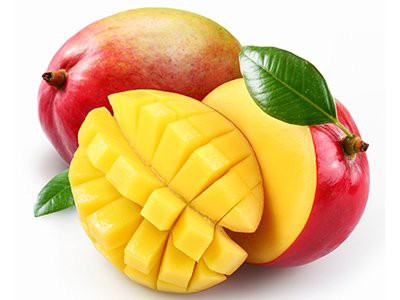Dog Pregnancy Calculator And Timeline
Can Dogs Eat Mango? Yes, dogs can eat mangoes safely but make sure that your dogs are not allergic to mangoes before feeding them. Dogs enjoy mangoes as a treat.
Mango contains huge amounts of vitamin E, C, B6, A, and fiber as well making it a complete treat for dogs as well as for humans. Mango also tastes richly sweet making it instantly likable fruit for your dog to consume.
Mangoes, with their sweet and juicy insides and tough but edible skin on the outside, are delicious and good for humans. This amazing fruit is native to Asia and India, and there are nearly 500 varieties of fruit in the world.
Overall, all experts agree that mango is safe for dogs to eat, but some experts might not recommend feeding it to dogs.
Let’s find out more about mango for dogs below.
Are Mangoes Good For Dogs?
Yes. It is not only good for canines but also one of the best and healthy treat for them. Specifically, the soft flesh is easy for dogs to eat.
Mango is also a great source of potassium and vitamins such as vitamin A, vitamin B6, vitamin C, and vitamin E. These vitamins are vital for your dog’s health.
Also, mango doesn’t contain any added sugar. So, a small piece of mango can get your dog back on track when it is tired.
Mango is rich not only rich in vitamins but also a great source of protein and dietary fiber.
- A Vitamin – 72% DV
- B6 Vitamin – 20% DV
- C Vitamin – 203% DV
- Calories – 201
- Dietary Fiber – 5 grams
- Vitamin K – 16% DV
- Magnesium – 8% DV
- Potassium – 564 mg
- Protein – 2.8 grams
Health Benefits of Mango For Dogs
Mango provides a lot of benefits to dogs. Fiber and antioxidants in it will provide more benefits to your dog’s overall health.
- It has a high content of antioxidants such as methyl gallate, astragalin, fisetin, gallic acid, quercetin, and isoquercitrin. Antioxidants fight against melanoma in dogs.
- Mango is rich in fiber which aids in the digestion process and helps to keep their stool as soft, regular, and painless as possible.
- It is also a great provider of pectin.
- Mango is also an excellent provider of flavonoids such as alpha-carotene and beta-carotene.
- It helps to lower cholesterol levels and to boost your dog’s immune system if consumed in a small quantity.
If you feed mango in small amounts, it can provide the following benefits.
- Helps to maintain your dog’s electrolyte balance
- Improves your dog’s eyesight
- Mango prevents skin infections
Is Mango Safe For Dogs To Eat?
No. Mango is not 100% safe for dogs. The following detailed explanation will make you understand why mango is not safe for dogs.
Not all parts of mango are good for your dog
Sometimes, dogs may feel difficult to digest the skin of mango if it is hard. Mango seed or pit can cause a choking hazard in canines.
Mango contains a lot of fiber
Most dogs aren’t used to fiber content and this will end up in an upset stomach or diarrhea.
It has a high concentration of natural fructose
Fructose is an organic sugar that is healthier than highly processed sugars. But, your dog’s digestive system has not been designed to digest large quantities of sugar.
If you feed mango in large quantities, it can lead to an upset stomach or diarrhea.
So, the mango fruit is full of vitamins and safe for your pup to consume, as long as it’s peeled and the pit is removed.
It’s important to note that you should only give your canine companion mango in moderation.
Can Dogs Eat Mango Pits?
There is conflicting information about whether the pit is toxic to dogs or not. Generally, a mango consists of three parts: the outer skin, the juicy fruit inside, and the seed/pit.
The mango pit is usually large and if swallowed, it will easily cause a choking hazard on your dog. Even if your pooch swallows the seed or pit, it will create stomach or intestinal issues in canines.
The pit can also cause intestinal blockage in dogs if consumed. Some experts say that the mango pit also contains cyanide, which is toxic to dogs.
But, a study from 2011 in the International Food Research Journal doesn’t list mango seed as containing anything toxic either. In fact, it found that there were a lot of nutritional benefits in the seed.
As the researchers note, “The results of the proximate analysis show that mango seed kernel is a nutritional promising seed because of its high levels of carbohydrate and oil.
The results of mineral assayed showed that mango seed is very rich in calcium, potassium, and magnesium.
The presence of antioxidant vitamins such as vitamins C, E and A suggests that mango seed could be used as an alternative source of these vitamins.”
So, it is advisable to feed mango to your dog without the pit.

What To Do If Your Dog Swallows A Mango Seed?
Unfortunately, if the mango pit gets stuck in your dog’s digestive tract, it may start to cough, gulp, and refuse to eat or drink anything.
If you notice such signs in your dog, the mango seed might have stuck in the dog’s esophagus or intestines. But, you should also check for signs of foreign obstruction.
According to VCA Hospitals, those include:
- Abdominal tenderness or pain
- Changes in behavior such as biting or growling when picked up or handled around the abdomen.
- Decreased appetite or anorexia
- Diarrhea
- Lethargy
- Straining to defecate or producing small amounts of feces
- Vomiting
There is a possibility of your dog to chew long and hard on the mango seed, which will cause significant tooth damage in it.
In such situations, it’s better to contact your vet and he will remove the mango seed properly and safely from your pooch’s esophagus, stomach, or intestine.
If you also notice changes in your dog’s eating habits, call your veterinarian right away.
Can Dogs Eat Mango Skin?
No. The skin of a mango is generally rough and is made of plant cellulose, which is difficult for a dog to digest.
Most dogs also don’t chew their food as they should and therefore large pieces of mango skin can block the intestines.
As intestinal blockage is a life-threatening condition, it is recommended to peel the mango before feeding it to your dog.
Mango is also actually a member of the poison ivy family. So, if your dog is prone to contact dermatitis, it may be allergic to mango skin due to the presence of the compound “Urushiol” in it.
Urushiol can potentially cause mild skin rash or itch in dogs when they ingest the mango skin.
But, it is only the mango skin and “green parts” that actually contain the toxic compound. As such, dogs should never be fed mango skin.
And, if your dog accidentally ate mango skin, observe for excess scratching in it. In such cases of allergies, you can give your dog a dosage of Benadryl. Also, get advice from the vet and make sure you give your dog the proper dosage.
Can Dogs Have Dried Mango?
Yes. Dogs can have dried mango as it is considered safe for dogs.
If your dog likes the taste and texture of dried mango, it will likely eat a piece of it without hesitation. It will even beg for more as well.
But, you should give dried mango to your dog with certain precautions.
- It need not be a necessary part of your dog’s diet.
- Dried mango may have a high concentration of sugar, which can increase calories in your pooch. So, feed it in moderation.
How Much Mangoes Can Dogs Eat?
Dog owners should always be careful about the amount of mango they feed to dogs. As too much of any fruit can cause diarrhea and stomach pain in dogs, feeding your pooch a few, small pieces of mango slices a day seems to be the sweet spot.
Don’t make the mistake of feeding them too many mangoes all at once because that will most likely lead to diarrhea or a painful stomach ache for your dog.
Given the fact that some canines are just born allergic to mangoes, start off by only feeding them just a tiny amount of mango slices and see how they react to them before attempting to feed them anymore.
This is especially true when it comes to mangoes because this fruit isn’t exactly the most common of fruits that are frequently fed to dogs.
Once you make sure your dog isn’t allergic to mangoes, you’re good to go and are able to feed them a moderate amount of mango slices every now and then as a treat. You should be careful not to give your dog too much mango.
If you have questions or concerns about feeding your dog mango, consult a veterinarian.
How To Feed Your Dog With Mangoes?
Peel the skin and remove the center pit. The mango pit contains cyanide, which can be potentially harmful to your dog. Mango pits can also get caught in the digestive tract and can become a choking hazard.
Ripe mangoes need not be sliced into small pieces unless you are feeding a small dog. Dogs love mangoes and too much may cause diarrhea and bellyaches in dogs because dogs are not designed to handle large fiber contents.
Be ready to call the vet if the dog had consumed the pit by mistake. Dogs can eat mangoes but not the seeds because mango seeds contain cyanide which is poisonous to dogs.
Even you should not feed your dog with mango skin, which is urushiol for dogs. Urushiol is an oily compound found in mango skin which causes bad rashes on your dog’s skin.
Generally, ripe mangoes are soft, tasty and safe to your dogs. Just don’t forget to remove the peels. Undoubtedly, rotten mangoes are harmful to your dogs because rotten mango contains ethanol, which is dangerous to your dogs like alcohol.
Precautions:
According to pet poison helpline, moldy mangoes are highly toxic to dogs and cause tremors and seizures in canines. Feeding to much of mangoes to your dogs may cause diarrhea, eating a mango per day is safer to your dogs.
As mangoes are rich in many valuable nutrients it’s not only safe but also beneficial to your dog’s health.
Can Dogs Eat Mango? - FAQs
1. Can dogs eat mango leaves?
No. Mango leaves may have numerous health benefits for humans, but they can make your dog ill. So, it should be removed and kept far away from your dog’s reach.
So, basically, the only part of the mango any pup is allowed to eat is strictly the mango flesh.
2. Can mangos treat any health issues in dogs?
Mangoes are known to have properties that aid in stabilizing insulin levels in the body, which goes a long way in helping patients with diabetes.
The same effect is expected to occur in your pooch’s body, but it’s always best that you talk to your veterinarian before you feed your canine any mango if they’re diabetic.
3. Can dogs have frozen mango?
No. It is not advisable to feed frozen mango to your dog as any organic food is always the better option than frozen food.
Frozen mango also contains fewer vitamins and minerals when compared with fresh mango. In addition, there are also high chances of preservatives and artificial sweeteners in frozen mango.
So, always feed fresh mango to your dog.


















